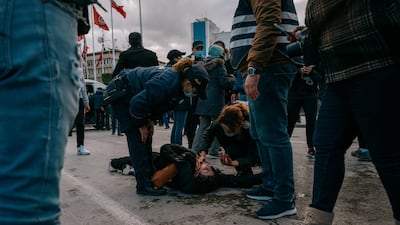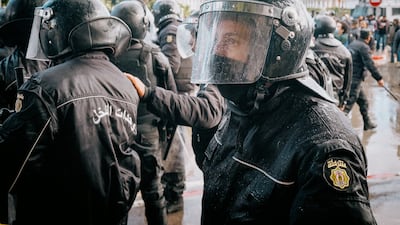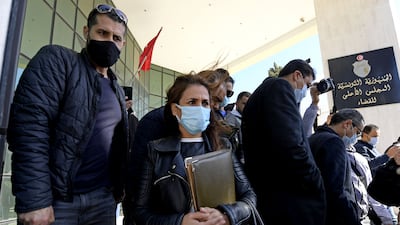Tunisian President Kais Saied is under renewed pressure from foreign donors following remarks indicating he might dissolve the country’s Supreme Judicial Council.
The country’s top court is supposed to maintain an independent judiciary free of political interference, but Mr Saied has accused it of being politically compromised and allowing cases to drag on for years with no outcome, including two linked to political assassinations in 2013.
On Monday, police closed off entry to the Supreme Judicial Council's main offices.






The head of the council, Youssef Bouzakher, told Reuters its members were defying Mr Saied's push to close it and were discussing via email their next steps.
Mr Saied said any move against the Supreme Judicial Council would be temporary, but many are unconvinced.
"I assure everyone in Tunisia and abroad that I will not interfere in the judiciary. I will not interfere in any case or any appointment. I do not want to control all power," Mr Saied said on Monday.
Ambassadors to Tunisia from the G7 group of democracies said "a transparent, independent and efficient judiciary and the separation of powers are essential for a functioning democracy that serves its people".
On Tuesday, Foreign Minister Othman Jerandi received ambassadors of the G7 group and the representative of the Commission on Human Rights and informed them of the president's decision to dissolve the Supreme Judicial Council, and wider aims to reform the judiciary.
"The president's decision does not aim in any way to put a hand on the judiciary", he said.
Tunisia faces a crisis in public finances, with Tunisians already complaining of food shortages and the central bank governor predicting an economic collapse like those in Venezuela or Lebanon.
While Tunisia has started talks with the International Monetary Fund for a rescue package, donors have urged Mr Saied to adopt an inclusive approach to reforms.
The president has promised to uphold rights and freedoms Tunisians won in the 2011 revolution that triggered the Arab uprisings and brought democracy, but his latest move has increased concern for the continued rule of law.
In July he suspended parliament and dismissed the prime minister, later saying he could rule by decree while he prepares a new constitution that he says will be put to a referendum this summer.
However, rights groups fear he is growing increasingly authoritarian and his latest move to bring the judiciary under his control would mean he had absolute power over all branches of state.
UN rights chief Michelle Bachelet, also urged Mr Saied to restore the council, warning its dissolution "would seriously undermine the rule of law".
Rights group Amnesty International said the move posed "a grave threat to fair trial rights in Tunisia".
Tunisia's association of judges said it would suspend all work in courts on Wednesday and Thursday, and judges would hold a protest against Mr Saied's decision on Thursday.
Killing of Qassem Suleimani
National Editorial: Suleimani has been killed, now we must de-escalate
Mina Al Oraibi: Air strike casts a long shadow over the decade ahead
Jack Moore: Why the assassination is such a monumental gamble
Matthew Levitt: Iran retains its ability to launch terror attacks
Damien McElroy: A CEO tasked with spreading Iran's influence
Simon Waldman: Cautious Israel keeping a low profile
Mohammed bin Zayed Majlis
'Midnights'
World Mental Health Day
While you're here
Richard Heydarian: Decoding Asean's deliberate silence over the Myanmar coup
Kareem Shaheen: Our Myanmar reactions shaped by simplistic narratives
Sholto Byrnes: Washington tells South-East Asians to pick a side
Killing of Qassem Suleimani
National Editorial: Suleimani has been killed, now we must de-escalate
Jack Moore: Why the assassination is such a monumental gamble
Matthew Levitt: Iran retains its ability to launch terror attacks
Damien McElroy: A CEO tasked with spreading Iran's influence
Hussein Ibish: Trump's order on solid constitutional ground
Simon Waldman: Cautious Israel keeping a low profile
Mohammed bin Zayed Majlis
Zayed Sustainability Prize
Transgender report
More from Neighbourhood Watch:
Transgender report
Killing of Qassem Suleimani
Mina Al Oraibi: Air strike casts a long shadow over the decade ahead
Jack Moore: Why the assassination is such a monumental gamble
Matthew Levitt: Iran retains its ability to launch terror attacks
Damien McElroy: A CEO tasked with spreading Iran's influence
Hussein Ibish: Trump's order on solid constitutional ground
Simon Waldman: Cautious Israel keeping a low profile
Plastic tipping point
GAC GS8 Specs
Engine: 2.0-litre 4cyl turbo
Power: 248hp at 5,200rpm
Torque: 400Nm at 1,750-4,000rpm
Transmission: 8-speed auto
Fuel consumption: 9.1L/100km
On sale: Now
Price: From Dh149,900
Zayed Sustainability Prize
World Mental Health Day
The Indoor Cricket World Cup
When: September 16-23
Where: Insportz, Dubai
Indoor cricket World Cup:
Insportz, Dubai, September 16-23
UAE fixtures:
Men
Saturday, September 16 – 1.45pm, v New Zealand
Sunday, September 17 – 10.30am, v Australia; 3.45pm, v South Africa
Monday, September 18 – 2pm, v England; 7.15pm, v India
Tuesday, September 19 – 12.15pm, v Singapore; 5.30pm, v Sri Lanka
Thursday, September 21 – 2pm v Malaysia
Friday, September 22 – 3.30pm, semi-final
Saturday, September 23 – 3pm, grand final
Women
Saturday, September 16 – 5.15pm, v Australia
Sunday, September 17 – 2pm, v South Africa; 7.15pm, v New Zealand
Monday, September 18 – 5.30pm, v England
Tuesday, September 19 – 10.30am, v New Zealand; 3.45pm, v South Africa
Thursday, September 21 – 12.15pm, v Australia
Friday, September 22 – 1.30pm, semi-final
Saturday, September 23 – 1pm, grand final
Read more about the coronavirus
On Women's Day
Dr Nawal Al-Hosany: Why more women should be on the frontlines of climate action
Shelina Janmohamed: Why shouldn't a spouse be compensated fairly for housework?
Samar Elmnhrawy: How companies in the Middle East can catch up on gender equality
The National Editorial: Is there much to celebrate on International Women's Day 2021?
Our commentary on Brexit
- Alistair Burt: Despite Brexit, Britain can remain a world power
- Sam Williams: Departure is influenced by its sense of place
More on Quran memorisation:
Tomorrow 2021
Killing of Qassem Suleimani
National Editorial: Suleimani has been killed, now we must de-escalate
Mina Al Oraibi: Air strike casts a long shadow over the decade ahead
Jack Moore: Why the assassination is such a monumental gamble
Damien McElroy: A CEO tasked with spreading Iran's influence
Hussein Ibish: Trump's order on solid constitutional ground
Simon Waldman: Cautious Israel keeping a low profile
• Remittance charges will be tackled by blockchain
• UAE's monumental and risky Mars Mission to inspire future generations, says minister
• Could the UAE drive India's economy?
• News has a bright future and the UAE is at the heart of it
• Architecture is over - here's cybertecture
• The National announces Future of News journalism competition
• Round up: Experts share their visions of the world to come
What is 'Soft Power'?
Soft power was first mentioned in 1990 by former US Defence Secretary Joseph Nye.
He believed that there were alternative ways of cultivating support from other countries, instead of achieving goals using military strength.
Soft power is, at its root, the ability to convince other states to do what you want without force.
This is traditionally achieved by proving that you share morals and values.
Whiile you're here
Damien McElroy: Anti-science attitudes in America are proving lethal
Editorial: What makes the UAE such a good place to test vaccines?
Editorial: The fight against Covid-19 should be guided by science
The specs
More from Con Coughlin
Killing of Qassem Suleimani
National Editorial: Suleimani has been killed, now we must de-escalate
Mina Al Oraibi: Air strike casts a long shadow over the decade ahead
Jack Moore: Why the assassination is such a monumental gamble
Matthew Levitt: Iran retains its ability to launch terror attacks
Damien McElroy: A CEO tasked with spreading Iran's influence
Hussein Ibish: Trump's order on solid constitutional ground
Rashmee Roshan Lall: Sound of silence in South Asia
You might also like
While you're here
Cheryl Thompson: Stop the practice of blackface that's as Canadian as hockey
Kareem Shaheen: Alghabra outshines the racists who malign him
Kareem Shaheen: In Canada, I have finally found a home
Hydrogen: Market potential
Hydrogen has an estimated $11 trillion market potential, according to Bank of America Securities and is expected to generate $2.5tn in direct revenues and $11tn of indirect infrastructure by 2050 as its production increases six-fold.
"We believe we are reaching the point of harnessing the element that comprises 90 per cent of the universe, effectively and economically,” the bank said in a recent report.
Falling costs of renewable energy and electrolysers used in green hydrogen production is one of the main catalysts for the increasingly bullish sentiment over the element.
The cost of electrolysers used in green hydrogen production has halved over the last five years and will fall to 60 to 90 per cent by the end of the decade, acceding to Haim Israel, equity strategist at Merrill Lynch. A global focus on decarbonisation and sustainability is also a big driver in its development.
Sholto Byrnes on Myanmar politics
China and the UAE agree comprehensive strategic partnership
China and the UAE forged even closer links between the two countries during the landmark state visit after finalising a ten-point agreement on a range of issues, from international affairs to the economy and trade and renewable energy.
1. Politics: The two countries agreed to support each other on issues of security and to work together on regional and international challenges. The nations also confirmed that the number of high-level state visits between China and the UAE will increase.
2. Economy: The UAE offers its full support to China's Belt and Road Initiative, which will combine a land 'economic belt" and a "maritime silk road" that will link China with the Arabian Gulf as well as Southeast, South and Central China, North Africa and, eventually, Europe.
3. Business and innovation: The two nations are committed to exploring new partnerships in sectors such as Artificial Intelligence, energy, the aviation and transport industries and have vowed to build economic co-operation through the UAE-China Business Committee.
4. Education, science and technology: The Partnership Programme between Arab countries in Science and Technology will encourage young Emirati scientists to conduct research in China, while the nations will work together on the peaceful use of nuclear energy, renewable energy and space projects.
5. Renewable energy and water: The two countries will partner to develop renewable energy schemes and work to reduce climate change. The nations have also reiterated their support for the Abu Dhabi-based International Renewable Energy Agency.
6. Oil and gas: The UAE and China will work in partnership in the crude oil trade and the exploration and development of oil and natural gas resources.
7. Military and law enforcement and security fields: Joint training will take place between the Chinese and UAE armed forces, while the two nations will step up efforts to combat terrorism and organised crime.
8. Culture and humanitarian issues: Joint cultural projects will be developed and partnerships will be cultivated on the preservation of heritage, contemporary art and tourism.
9. Movement between countries: China and the UAE made clear their intent to encourage travel between the countries through a wide-ranging visa waiver agreement.
10. Implementing the strategic partnership: The Intergovernmental Co-operation Committee, established last year, will be used to ensure the objectives of the partnership are implemented.
Killing of Qassem Suleimani
National Editorial: Suleimani has been killed, now we must de-escalate
Mina Al Oraibi: Air strike casts a long shadow over the decade ahead
Matthew Levitt: Iran retains its ability to launch terror attacks
Damien McElroy: A CEO tasked with spreading Iran's influence
Hussein Ibish: Trump's order on solid constitutional ground
Simon Waldman: Cautious Israel keeping a low profile
Plastic tipping points
'The worst thing you can eat'
Trans fat is typically found in fried and baked goods, but you may be consuming more than you think.
Powdered coffee creamer, microwave popcorn and virtually anything processed with a crust is likely to contain it, as this guide from Mayo Clinic outlines:
Baked goods - Most cakes, cookies, pie crusts and crackers contain shortening, which is usually made from partially hydrogenated vegetable oil. Ready-made frosting is another source of trans fat.
Snacks - Potato, corn and tortilla chips often contain trans fat. And while popcorn can be a healthy snack, many types of packaged or microwave popcorn use trans fat to help cook or flavour the popcorn.
Fried food - Foods that require deep frying — french fries, doughnuts and fried chicken — can contain trans fat from the oil used in the cooking process.
Refrigerator dough - Products such as canned biscuits and cinnamon rolls often contain trans fat, as do frozen pizza crusts.
Creamer and margarine - Nondairy coffee creamer and stick margarines also may contain partially hydrogenated vegetable oils.
On Women's Day
Dr Nawal Al-Hosany: Why more women should be on the frontlines of climate action
Shelina Janmohamed: Why shouldn't a spouse be compensated fairly for housework?
Justin Thomas: Challenge the notion that 'men are from Mars, women are from Venus'
The National Editorial: Is there much to celebrate on International Women's Day 2021?
While you're here
Kareem Shaheen: Even a pandemic could not unite today's America
Michele Wucker: The difference between a black swan and a grey rhino
Robert Matthews: Has flawed science and rushed research failed us?
Neighbourhood Watch
While you're here
Mustafa Alrawi: To get the 'jab' done, there must be patience and empathy
Damien McElroy: Anti-science attitudes in America are proving lethal
Editorial: What makes the UAE such a good place to test vaccines?
Editorial: The fight against Covid-19 should be guided by science
Towering concerns
While you're here
More from Neighbourhood Watch:
Director: Romany Saad
Starring: Mirfat Amin, Boumi Fouad and Tariq Al Ibyari
More on animal trafficking
More from Neighbourhood Watch
Read more from Aya Iskandarani
Lexus LX700h specs
Engine: 3.4-litre twin-turbo V6 plus supplementary electric motor
Power: 464hp at 5,200rpm
Torque: 790Nm from 2,000-3,600rpm
Transmission: 10-speed auto
Fuel consumption: 11.7L/100km
On sale: Now
Price: From Dh590,000
Specs
Engine: Duel electric motors
Power: 659hp
Torque: 1075Nm
On sale: Available for pre-order now
Price: On request
• Remittance charges will be tackled by blockchain
• UAE's monumental and risky Mars Mission to inspire future generations, says minister
• Could the UAE drive India's economy?
• News has a bright future and the UAE is at the heart of it
• Architecture is over - here's cybertecture
• The National announces Future of News journalism competition
• Round up: Experts share their visions of the world to come
Mohammed bin Zayed Majlis
Key figures in the life of the fort
Sheikh Dhiyab bin Isa (ruled 1761-1793) Built Qasr Al Hosn as a watchtower to guard over the only freshwater well on Abu Dhabi island.
Sheikh Shakhbut bin Dhiyab (ruled 1793-1816) Expanded the tower into a small fort and transferred his ruling place of residence from Liwa Oasis to the fort on the island.
Sheikh Tahnoon bin Shakhbut (ruled 1818-1833) Expanded Qasr Al Hosn further as Abu Dhabi grew from a small village of palm huts to a town of more than 5,000 inhabitants.
Sheikh Khalifa bin Shakhbut (ruled 1833-1845) Repaired and fortified the fort.
Sheikh Saeed bin Tahnoon (ruled 1845-1855) Turned Qasr Al Hosn into a strong two-storied structure.
Sheikh Zayed bin Khalifa (ruled 1855-1909) Expanded Qasr Al Hosn further to reflect the emirate's increasing prominence.
Sheikh Shakhbut bin Sultan (ruled 1928-1966) Renovated and enlarged Qasr Al Hosn, adding a decorative arch and two new villas.
Sheikh Zayed bin Sultan (ruled 1966-2004) Moved the royal residence to Al Manhal palace and kept his diwan at Qasr Al Hosn.
Sources: Jayanti Maitra, www.adach.ae
COMPANY%20PROFILE
On Women's Day
Shelina Janmohamed: Why shouldn't a spouse be compensated fairly for housework?
Samar Elmnhrawy: How companies in the Middle East can catch up on gender equality
The National Editorial: Is there much to celebrate on International Women's Day 2021?
Justin Thomas: Challenge the notion that 'men are from Mars, women are from Venus'
In-demand jobs and monthly salaries
- Technology expert in robotics and automation: Dh20,000 to Dh40,000
- Energy engineer: Dh25,000 to Dh30,000
- Production engineer: Dh30,000 to Dh40,000
- Data-driven supply chain management professional: Dh30,000 to Dh50,000
- HR leader: Dh40,000 to Dh60,000
- Engineering leader: Dh30,000 to Dh55,000
- Project manager: Dh55,000 to Dh65,000
- Senior reservoir engineer: Dh40,000 to Dh55,000
- Senior drilling engineer: Dh38,000 to Dh46,000
- Senior process engineer: Dh28,000 to Dh38,000
- Senior maintenance engineer: Dh22,000 to Dh34,000
- Field engineer: Dh6,500 to Dh7,500
- Field supervisor: Dh9,000 to Dh12,000
- Field operator: Dh5,000 to Dh7,000
Our commentary on Brexit
- Con Coughlin: Choice of the British people will be vindicated
- Sam Williams: Departure is influenced by its sense of place
While you're here
Aya Iskandarani: Why Hezbollah’s man in Iraq is now worth $10 million to the US
Khaled Yacoub Oweis: Hezbollah bids to control Lebanon’s financial system
National Editorial: Hezbollah's murky dealings in Iraq have been unveiled
On Women's Day
Dr Nawal Al-Hosany: Why more women should be on the frontlines of climate action
Shelina Janmohamed: Why shouldn't a spouse be compensated fairly for housework?
Samar Elmnhrawy: How companies in the Middle East can catch up on gender equality
Justin Thomas: Challenge the notion that 'men are from Mars, women are from Venus'
THE SPECS
BMW X7 xDrive 50i
Engine: 4.4-litre V8
Transmission: Eight-speed Steptronic transmission
Power: 462hp
Torque: 650Nm
Price: Dh600,000
Tomorrow 2021
The burning issue
The internal combustion engine is facing a watershed moment – major manufacturer Volvo is to stop producing petroleum-powered vehicles by 2021 and countries in Europe, including the UK, have vowed to ban their sale before 2040. The National takes a look at the story of one of the most successful technologies of the last 100 years and how it has impacted life in the UAE.
Read part four: an affection for classic cars lives on
Read part three: the age of the electric vehicle begins
Read part two: how climate change drove the race for an alternative
While you're here
Con Coughlin: To survive, Nato must renew its sense of common purpose
Gavin Esler: Nato summit failed for making news more than it made deals
Simon Waldman: Nato continues to be Ankara’s best security guarantor


